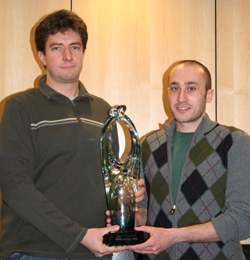Enertia and ABC take 1st and 2nd prizes in the clean energy prize business plan competition
The competition was established by DTE Energy and the University of Michigan to encourage entrepreneurship and the development of clean-energy technologies.

 Enlarge
Enlarge
The first and second place teams in the 2009-2010 Clean Energy Prize business plan competition, established by DTE Energy and the University of Michigan, featured technology developed in the Department of Electrical Engineering and Computer Science.
The team Enertia, comprised of Tzeno Galchev and Ethem Aktakka, PhD fellows in electrical engineering, and Adam Carver, U-M MBA student, won the top prize of $50,000.
Second prize went to Advanced Battery Control (ABC), a team composed of Fangjian Jin, graduate student in CSE, Paul Gruber, an MBA/MS student at U-M’s Erb Institute for Global Sustainability, financial officer Drew Demuth, an MBA at the Ross School of Business, and Dr. Hahnsang Kim, post-doctoral fellow.
Enertia
Team Enertia impressed the judges with its plan for a device that can harness vibrations to generate electricity to power small electronics, such as remote sensors and surgically implanted medical equipment. The small generators can extend the lifetime of wireless electronic devices tenfold, while at the same time replacing toxic electrochemical batteries.
Both Galchev and Aktakka conduct research in energy harvesting technology, under the direction of Prof. Khalil Najafi, Schlumberger Professor of Engineering and Chair of Electrical and Computer Engineering.
Galchev conducts research in energy scavenging from vibrations, and has developed a technology which can scavenge low-frequency non-periodic vibrations (ie, arbitrary environmental vibrations) and convert this mechanical energy into electricity for powering various electronic devices requiring a long-lifetime.
Aktakka has developed a fabrication process which enables the use of high quality bulk materials in microfabrication, with the goal of producing very high efficiency integrated vibrations scavengers.
The technology upon which Enertia based its business plan was developed within the Center for Wireless Integrated Microsystems, and the company is presently in negotiations with the University on the licensing of intellectual property. The team intends to participate in additional business plan competitions with support from the U-M Zell Lurie Institute and the U-M Office of Technology Transfer.
Advanced Battery Control
The ABC team plans to produce a proprietary smart battery management system which will radically enhance battery functionality and utilization in electric vehicles. The annual market for hybrid, plug-in hybrid, and all electric vehicles is expected to grow to $12 billion by 2015.
The ABC system, known as DESA (Dependable, Efficient, Scalable Architecture), is comprised of a proprietary software algorithm, reconfigurable hardware array, and scalable system architecture developed in the U-M Real Time Computing Laboratory under the direction of Prof. Kang Shin, Kevin and Nancy O’Connor Professor of Computer Science. The DESA platform has the potential to halve the cost and size of electric vehicle battery packs through smarter battery management.
This team is working to commercialize the DESA platform by completing and scaling its prototype this summer, pursuing state and Federal grants, and seeking partnerships with battery pack manufacturers and electric vehicle manufacturers desiring a better battery management system. The team is also planning on participating in additional business plan competitions with support from the U-M Zell Lurie Institute and the U-M Office of Technology Transfer.
The Clean Energy Prize Encourages Entrepreneurs
The Clean Energy Prize competition was established by DTE Energy and the University of Michigan to encourage entrepreneurship in Michigan and the development of clean-energy technologies. The Masco Corporation Foundation and The Kresge Foundation were Clean Energy Prize founding sponsors and they continue to support the competition. Additional sponsors include UBS Investment Bank, Google and Nth Power, a clean-tech venture capital company.
“We see the competition as a catalyst for students and faculty at Michigan’s universities to bring new energy technologies out of the labs and into the marketplace,” said DTE Energy President Gerry Anderson. “And in doing that, it helps create a culture of innovators and the venture capitalists that support them. What (the competitors) did as part of this Clean Energy Prize competition is exactly what we need more of in Michigan.
The U-M Ross School of Business’ Ross Energy Club along with the Michigan Memorial Phoenix Energy Institute and the Michigan Initiative for Innovation and Entrepreneurship organized the competition. Several other University of Michigan entities also provided support, including the College of Engineering’s Center for Entrepreneurship, the Zell Lurie Institute for Entrepreneurial Studies, the U-M Business Engagement Center and MPowered Entrepreneurship.
EECS Leads in Tech Transfer Activity
The Department of Electrical Engineering and Computer Science is a leader in the transfer of technology to the marketplace. EECS leads the University once again in invention reports for a single unit, according to the Office of Technology Transfer 2009 Annual Report.
Nearly forty companies have been started by EECS faculty and students in areas ranging from optics (including laser eye surgery), to environmental sensors, energy, microelectronics, communications, network security, cognitive software, even web TV. Several more are in the planning stages, or just about to open.
As noted above, there are many resources for students who want to pursue their entrepreneurial dreams. Once they have a clear vision and technology in hand, EECS students regularly take advantage of the business plan competitions organized by the U-M Ross School of Business, and in notable cases have gone on to win these competitions and start companies with their technology. Both Enertia and ABC are on a clear path to success.
 MENU
MENU 
